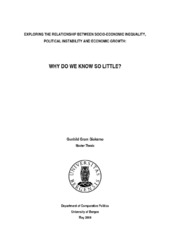| dc.contributor.author | Giskemo, Gunhild Gram | eng |
| dc.date.accessioned | 2012-01-10T08:19:22Z | |
| dc.date.available | 2012-01-10T08:19:22Z | |
| dc.date.issued | 2008-05 | eng |
| dc.identifier.uri | https://hdl.handle.net/1956/5381 | |
| dc.description.abstract | This thesis investigates the contention that socio-economic inequality has a detrimental effect on economic growth by breeding political instability. This hypothesised causal pattern has been subject to academic interest and empirical investigation for centuries, but still no agreement has been reached as to what the relationships really look like. During the 1990s the number of quantitative studies in this field increased dramatically, but they reached highly different conclusions. An important objective of this thesis is to explore what lies behind these inconsistent empirical findings.The hypothesised causal pattern is investigated both theoretically and empirically. Socio-economic inequality is thought to produce political instability by breeding relative deprivation and discontent. Political instability is, in turn, likely to decrease growth because it constitutes a disincentive to invest. These hypotheses are explored through cross-national time-series regression analyses of a total of 188 countries from 1950 to 2004. This study is the first to use the recently updated and expanded dataset on socio-economic inequality provided by the UN-based World Institute for Development Economics Research in May 2007. Previously, lack of comparable and extensive data on this variable has made it difficult to conduct large-scale quantitative analysis of the political and economic effects of socio-economic instability.The analytical results reveal the following: while instability does seem to affect growth negatively, the hypothesis that inequality breeds political unrest is not unanimously supported. This is because a series of robustness tests show that the results are dependent on how inequality and instability are measured. The use of the largest and most recently updated data source on socio-economic inequality has thus not contributed to clarifying whether inequality reduces economic growth by breeding political instability. It has contributed in a different way, however, because the analysis offers a possible explanation of why previous empirical studies have reported such diverging findings: namely that they measure socio-economic inequality and political instability in different ways. This is an important finding because it shows that the reliability of the conclusions of existing studies can be questioned. | en_US |
| dc.language.iso | eng | eng |
| dc.publisher | The University of Bergen | eng |
| dc.subject | Socio-economic inequality | eng |
| dc.subject | Political instability | eng |
| dc.title | Exploring the relationship between socio-economic inequality, political instability and economic growth: Why do we know so little?" | eng |
| dc.type | Master thesis | en_US |
| dc.rights.holder | Copyright the author. All rights reserved | en_US |
| dc.subject.nsi | VDP::Social science: 200::Political science and organizational theory: 240::Comparative politics: 241 | eng |
